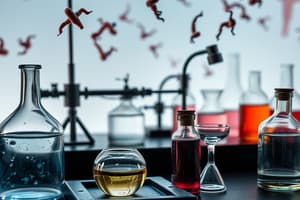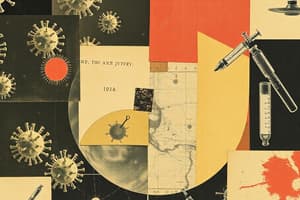Podcast
Questions and Answers
What was the significance of Edward Jenner's work in 1796?
What was the significance of Edward Jenner's work in 1796?
- He identified the first pathogenic bacterium.
- He discovered the first antibiotic.
- He developed the first successful vaccine. (correct)
- He introduced chemotherapy for treatment.
Which of the following best describes the role of Paul Ehrlich in microbiology?
Which of the following best describes the role of Paul Ehrlich in microbiology?
- He pioneered the concept of chemotherapy. (correct)
- He identified cowpox as a vaccine source.
- He discovered penicillin as the first antibiotic.
- He established bacteriology as a field.
What was a major outcome of Alexander Fleming's discovery in 1928?
What was a major outcome of Alexander Fleming's discovery in 1928?
- It revolutionized the treatment of bacterial infections. (correct)
- It established the foundations of microbiology.
- It led to the identification of pathogenic bacteria.
- It resulted in the development of the first vaccine.
What is the minimum requirement for a microorganism to be classified as the cause of a disease?
What is the minimum requirement for a microorganism to be classified as the cause of a disease?
What makes the bacterium Thiomargarita namibiensis unique?
What makes the bacterium Thiomargarita namibiensis unique?
What area of study focuses on bacteria and their roles?
What area of study focuses on bacteria and their roles?
What compound did Paul Ehrlich discover that was effective against syphilis?
What compound did Paul Ehrlich discover that was effective against syphilis?
Which of the following statements about bacterial discovery is accurate?
Which of the following statements about bacterial discovery is accurate?
What significant contribution to surgical practice did Joseph Lister make?
What significant contribution to surgical practice did Joseph Lister make?
Which scientist first demonstrated that a microorganism could cause a disease in animals?
Which scientist first demonstrated that a microorganism could cause a disease in animals?
What practice did Ignaz Semmelweis advocate to reduce disease transmission in maternity wards?
What practice did Ignaz Semmelweis advocate to reduce disease transmission in maternity wards?
Which factor contributes to the emergence of infectious diseases?
Which factor contributes to the emergence of infectious diseases?
What is a consequence of evolving pathogens in changing ecologies?
What is a consequence of evolving pathogens in changing ecologies?
What are Koch's postulates primarily used for?
What are Koch's postulates primarily used for?
What significant discovery did Oswald Avery, Colin MacLeod, and Maclyn McCarty make in the 1940s?
What significant discovery did Oswald Avery, Colin MacLeod, and Maclyn McCarty make in the 1940s?
What was identified as a major flaw of the early germ theory of disease?
What was identified as a major flaw of the early germ theory of disease?
Which of the following demonstrated the connection between genetic material and biochemical processes?
Which of the following demonstrated the connection between genetic material and biochemical processes?
Which disease is primarily associated with Aedes mosquitoes?
Which disease is primarily associated with Aedes mosquitoes?
What type of illness is COVID-19 primarily classified as?
What type of illness is COVID-19 primarily classified as?
What did James Watson and Francis Crick propose in the 1950s?
What did James Watson and Francis Crick propose in the 1950s?
Which of the following diseases did Robert Koch identify the causative agent for?
Which of the following diseases did Robert Koch identify the causative agent for?
What major advancement in molecular genetics resulted from the study of bacteria?
What major advancement in molecular genetics resulted from the study of bacteria?
Which condition is linked with the Powassan virus?
Which condition is linked with the Powassan virus?
What was a significant outcome of Joseph Lister's methods in surgery?
What was a significant outcome of Joseph Lister's methods in surgery?
Which scientists were involved in discovering bacterial conjugation?
Which scientists were involved in discovering bacterial conjugation?
Which of the following methods was NOT a focus of Ignaz Semmelweis's findings?
Which of the following methods was NOT a focus of Ignaz Semmelweis's findings?
What did François Jacob and Jacques Monod unveil in the 1960s?
What did François Jacob and Jacques Monod unveil in the 1960s?
In what way was Wendell Stanley's research on the tobacco mosaic virus significant?
In what way was Wendell Stanley's research on the tobacco mosaic virus significant?
What was the main contribution of molecular genetics to microbiology during the 1940s?
What was the main contribution of molecular genetics to microbiology during the 1940s?
Which by-products are produced by bacteria during the sewage treatment process?
Which by-products are produced by bacteria during the sewage treatment process?
What is bioremediation primarily used for?
What is bioremediation primarily used for?
Which of the following options best describes how certain bacteria contribute to bioremediation?
Which of the following options best describes how certain bacteria contribute to bioremediation?
Which genera are commonly associated with microbes used in bioremediation?
Which genera are commonly associated with microbes used in bioremediation?
What role do beneficial nematodes play in pest control?
What role do beneficial nematodes play in pest control?
What is the primary method used by entomopathogenic fungi to control insect pest populations?
What is the primary method used by entomopathogenic fungi to control insect pest populations?
In what way are Bacillus enzymes used in household products?
In what way are Bacillus enzymes used in household products?
Which of the following describes the symbiotic relationship between nematodes and bacteria in pest control?
Which of the following describes the symbiotic relationship between nematodes and bacteria in pest control?
Flashcards are hidden until you start studying
Study Notes
The First Golden Age of Microbiology
- Joseph Lister introduced antiseptic surgical methods using carbolic acid, greatly reducing surgical infections and validating germ theory.
- Agostino Bassi demonstrated in 1835 that a fungus caused a silkworm disease, the first evidence of a microorganism causing animal disease, supporting germ theory.
- Ignaz Semmelweis found that handwashing with chlorinated lime decreased puerperal fever in maternity wards, highlighting hygiene's importance in disease prevention.
- Robert Koch formulated Koch’s postulates to link specific microbes to diseases, identifying causative agents of anthrax, tuberculosis, and cholera.
Koch’s Postulates
- Postulate 1: Microorganisms should be present in abundance in diseased organisms, absent in healthy ones.
- Postulate 2: They must be isolated and grown in pure culture.
- Postulate 3: Introduced microbes should cause disease in a healthy host.
- Postulate 4: The microorganism must be re-isolated from the experimental host and match the original causative agent.
Edward Jenner's Contribution
- In 1796, Edward Jenner developed the first vaccination using cowpox material to immunize against smallpox, laying the groundwork for immunology.
The Second Golden Age of Microbiology
- Paul Ehrlich pioneered chemotherapy, discovering Salvarsan, arsenic-based and effective against syphilis, marking a key advancement in antimicrobial treatment.
- Alexander Fleming discovered penicillin in 1928 from mold Penicillium notatum, transforming bacterial infection treatment and leading to new antibiotic developments.
Bacteriology and Significant Discoveries
- Bacteriology began with van Leeuwenhoek's examination of tooth scrapings, revealing pathogenic bacteria's roles in health and disease.
- Thiomargarita namibiensis, discovered by Heide Schulz in 1997, is a notable bacterium visible to the naked eye, thriving in African mud and processing hydrogen sulfide.
Evolution of Molecular Genetics
- George W. Beadle and Edward L. Tatum established the connection between genes and enzymes in the 1940s, linking genetics to biochemical processes.
- Oswald Avery and colleagues identified DNA as hereditary material, crucial for genetics.
- Joshua Lederberg and Edward L. Tatum explored bacterial conjugation, shedding light on genetic material exchange in bacteria.
- James Watson and Francis Crick proposed the DNA double helix model, explaining replication mechanisms.
- François Jacob and Jacques Monod discovered messenger RNA (mRNA) and gene regulation in bacteria, enhancing protein synthesis understanding.
Microbial Applications in Human Welfare
- Sewage treatment utilizes microbes to recycle water, converting organic materials into by-products that aid environmental sustainability.
- Bioremediation emerged in 1988, employing microbes to clean pollutants, with bacteria using hazardous substances as energy sources and breaking down toxins.
- Microbes in bioremediation can be native or genetically modified, with Pseudomonas and Bacillus species commonly used, including Bacillus enzymes in detergents.
Insect Pest Control through Microorganisms
- Entomopathogenic fungi (e.g., Beauveria bassiana) are used in integrated pest management to control insect populations while reducing chemical pesticide reliance.
- Beneficial nematodes (e.g., Steinernema) target soil insects, releasing symbiotic bacteria that produce toxins to kill pests.
Emerging Infectious Diseases (EIDs)
- Factors leading to EIDs include the evolution of existing organisms and the global spread of diseases due to modern transportation.
- Ecological changes increase human exposure to new infectious agents (e.g., deforestation linked to Venezuelan hemorrhagic virus).
- Notable EIDs include Zika virus (associated with birth defects), Ebola (high mortality hemorrhagic fever), SARS and MERS coronaviruses (severe respiratory illnesses), and COVID-19 (global pandemic caused by SARS-CoV-2).
Studying That Suits You
Use AI to generate personalized quizzes and flashcards to suit your learning preferences.




